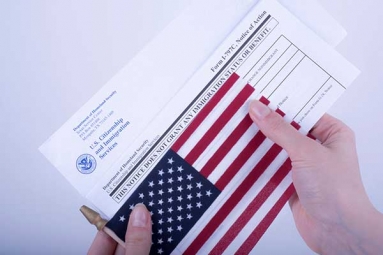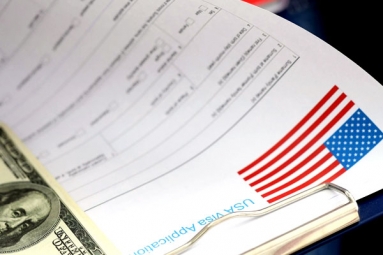
(Image source from: Forbes)
The United States has turned down work visas to employees of India’s largest IT services exporters inordinately in the past year.
According to data from the United States-based research foundation, the denial of work visas has risen to all-time high with country’s tech giants like Tata Consultancy Services, Infosys, HCL Technologies, and Wipro seeing half of their work visa applications being rejected reportedly due to Trump administration’s move to give more employment and wages for American workers.
TCS has witnessed 37 percent increase in visa denial rate during the first quarter of FY19 (October-December 2018) from 6 percent in FY15, according to a report by the National Foundation for American Policy (NFAP), which sourced data from the U.S. Citizenship and Immigration Services (USCIS) that follows a October-September financial year.
The denial rate for Infosys has gone up to 57 percent in the first quarter of FY19 from 2 percent in FY15.
HCL Technologies has witnessed a 43 percent increase in the denial rate from 2 percent in FY15.
In the case of Wipro, the denial rate increased to a whopping 62 percent from 7 percent in FY15, data from NFAP showed.
“The numbers have shot through the roof,” said Shivendra Singh, vice president of the global trade department at industry body NASSCOM. “The high (denial) rates and Request For Evidence (RFE) are impacting the ability of Indian companies to service clients in the key U.S. market besides making it more expensive,” he added.
NASSCOM’s Singh said the industry grouping has been arguing strongly for the U.S. to streamline the process so that “(Indian) IT companies continue to make the U.S. economy more competitive by working with more than 75 percent of Fortune 500 companies, the majority being American companies”.
“We are getting highly impacted by this since the numbers have never been this high. If the denial rate or RFEs are more, it increases the paperwork and there is more burden and more cost for companies,” he said.
Rajiv S Khanna, managing attorney at law firm Immigration.com, said, “Rate of denials have gone up across the board in all legal immigration cases, especially (relating to) H-1B visas. The government has created an environment where the responses for the RFEs have increased from 30-50 pages to 600-1,000 pages for an H-1B case. It has increased its burden of processing cases and that’s why cases are taking much longer to process than they used to.”
In April this year, Infosys said the rising attrition in its ranks was partially due to the sharp decline in H-1B visa approvals and said it had to come up with a “new value proposition” to help retain employees.
According to report, the attrition rate of Infosys had shot up to more than 18 percent at the end of March 2019 on a standalone annualized basis, compared with 16.6 percent in the same period early this year.
Chief operating officer of Infosys UB Pravin Rao said the company was seeing higher employee attrition in the three-five year experience bracket in India and the two-three year experience bracket in the United States for whom “the value proposition in the past has been onsite opportunities”, he had said.
According to industry experts, the increase in denial rates and scrutiny on non-immigrant visa applications is due to Trump administration’s executive order which seeks to create more employment and higher wages for American workers.
A group of U.S. lawmakers early this month expressed their concern over the soaring RFEs and visa denials, saying it was leading to the tech industry in Toronto growing faster than in Silicon Valley or Washington.
By Sowmya Sangam



















